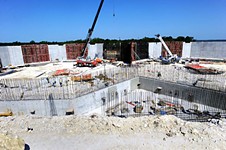Walking on the Water
Running hot or cold on the boardwalk
By Wells Dunbar, Fri., March 13, 2009
That didn't stop several boardwalk opponents from speaking that morning against the lake view obstruction-in-waiting. Fred Schmidt registered his displeasure by literally screaming "Wake up, Austin!" then questioning the environmental impact of the aforementioned "human highway" and "bicycle superroadway." Assistant Parks Director Stuart Strong defended the size of the boardwalk – 14 feet across, 6 feet above the water, and potentially 30 feet out from the shore – to the Chronicle by noting that its width is a national standard for multiuse trails, a requirement should the potentially $15 million project hope to receive federal dollars. Plus, says Strong, "If we built one that is too narrow, we'd get the opposite criticism."
As approved Thursday, City Council only set the boardwalk's path; further refinements and design decisions will be brought before the Parks and Recreation Board. Says Strong, "It will probably be in April before we get something to look at." Here's a proposal: As long as we're building a boardwalk, what's stopping a Coney Island-gone-Austin ideation, with veggie-hot-dog vendors and solar-powered carnival booths where you shoot recycled lake water into an eco-friendly plastic clown's mouth?
Let the Sun Shine In
Speaking of solar energy, Austin Energy's proposed 30-megawatt solar array also passed unanimously last week. The central question was how to shoulder the annual $10 million bill: whether to spread the tab among all AE ratepayers (adding about 60 cents to the average household's monthly bill) or offer the solar energy as part of AE's GreenChoice program, under which customers pay a premium for renewables (but could ultimately save, as the rate remains fixed over time). AE General Manager Roger Duncan announced it would be the latter in a March 2 memo, saying the utility would offer solar-only packages along with batches of blended renewables.
That still leaves solar relatively expensive – around 17 cents per kilowatt hour, according to enviro-energy maven and cantankerous council watcher Paul Robbins. However, compared to the cost of a new natural gas plant, plus a likely-to-be-determined federal carbon tax, Robbins found the cost comparable. The city also made an agreement with solar-farmers Gemini Solar Development Co. that any federal investment tax credits or incentives be passed through to AE to help buy down the cost of the batch.
However, Robbins also touched on the elephant in the chamber: worries that heavy energy users, such as chipmakers Freescale and Spansion (whose rates are already subsidized), would undermine additional renewable efforts. "There is a proposal, and it's really a rumor at this point ... that there's going to be some kind of possible stakeholders process or task force," Robbins said. "If the council feels the need for some kind of new process, I would ask that the large industrials of course be given access to it, but not be given veto power." And wouldn't you know, the project passed along with a provision creating a "stakeholder process" examining renewable energy. However, motion-maker Lee Leffingwell said, the board should be "diverse, representative of all sides, and not weighing in favor of any particular interest."
Free Association
The wonk's highlight last week was the presentation on ways to improve the council agenda process. The commonsense ideas presented: bringing back the precouncil work sessions and handling controversial zoning cases there, splitting meetings into morning and evening sessions, and simplifying posting language... This week, an ordinance prohibiting incentives for retail projects (Item 5: Call it "Domain Reprise") returns, having been pulled two weeks back to double-check the legal language... New permitting regulations for live-music venues (Item 17) come before council as the Live Music Task Force members continue their détente with neighborhoods... Seemingly spurred by the Rescue Austin Memorial Park/Austin Memorial Park Cemetery controversy, a new regulation would prohibit using city cemeteries as construction sites (Item 18).
Maybe new music clubs can open there instead.
Got something to say on the subject? Send a letter to the editor.










